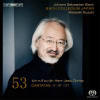Texte paru dans: / Appeared in:
*

GRAMOPHONE (08/2013)
Pour s'abonner /
Subscription information
BIS
1991

7318599919911 (ID325)

Reviewer: Jonathan
Freeman-Attwood
Late cantatas as Suzuki’s cycle nears its conclusion
There is something of a ‘genre within a genre’ when one reaches late Bach
cantatas – especially those works which Bach composed in the late 1730s,
when regular church composition had all but become a thing of the past. The
three pieces here appear to be late additions to the Jahrgang, or cycle, of
works devised around the hymnody of the annual calendar, which was consuming
Bach in 1724-25 and reached a sudden halt, perhaps with the death of his
librettist for the project.
The flavour of these three special works is encapsulated in the etched dialogues and textural luminosity of a distilled musical language drifting gently towards a galant sensibility. Masaaki Suzuki is fully awake to these nuances in the exquisite Es ist das Heil (BWV9), where the opening chorus irradiates the gift of salvation in a nutty wind concertante encircling the chorale melody, continued in an effervescent duet (‘Herr, du siehst statt guter Werke’) in which Hana BlaΩíková and Robin Blaze delectably encircle the returning winds in a chamber quartet performance of remarkable presence and poise.
Suzuki is equally responsive to the sizeable and rich tapestry of BWV177 (built on the melody ‘Ich ruf zu dir’), whose intensely focused rhetoric is seized upon by Collegium Musicum Japan, not least in the way the dancing tripla allows, paradoxically, for the supplicatory conceit to be afforded an unlikely sense of anticipation. If this is skilfully managed, then the courtly airiness given to the remaining strophes is often revelatory: again, BlaΩíková excels alongside Gerd Türk’s cheery celebration of constancy (with the memorable line ‘and He receives it free of charge’!), both soloists joined by outstanding oboe da caccia and bassoon obbligato accomplices.
Refinement also abounds in BWV97, with deftly executed concerto writing in the Allegro of the ‘French overture’ chorus and more elegant and delicate chamber conversations between singers and instruments. This is a wonderful celebration of all-too-rare late Bach vocal works, revealed to us by Suzuki with joy and an impeccable understanding of its unique essence.
Cliquez l'un ou l'autre
bouton pour découvrir bien d'autres critiques de CD
Click either button for many other reviews


